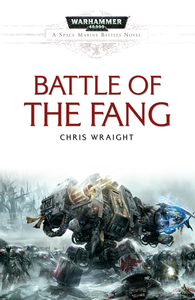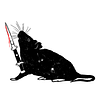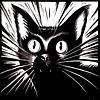Take a photo of a barcode or cover
adventurous
dark
mysterious
medium-paced
Plot or Character Driven:
A mix
inspiring
tense
fast-paced
Plot or Character Driven:
A mix
Strong character development:
No
Loveable characters:
Complicated
Diverse cast of characters:
Yes
Flaws of characters a main focus:
Yes
Really fun read, gives great info on the Space Wolves back story and what makes them who they are. Great fight sequences and many separate stories happening in tandem that are great to jump between.
February 2024 first time read as additional materials after completing the Horus Heresy Omnibus Project - Omnibus III The Burning of Prospero (https://www.heresyomnibus.com/omnibus/iii-the-burning-of-prospero) as part of my Oath of Moment to complete the Horus Heresy saga and just how much Prospero Burns by Dan Abnett demonstrated just how transcendent a story set in the Warhammer 40K universe can be, as well that book making me fall in love with the Vlka Fenryka.
I really don't know how I feel about this one. I'm simultaneously really rather impressed, left cold and disappointed, and eternally tired with the way women are written and discussed by so many Black Library books.
In a vacuum and as a book labelled "Space Marine Battles" it's really good and extremely competent at doing its job. It's certainly on the higher quality end of Black Library books, if a long way from the vaunted heights of the Inner Circle of greatness some of these books rise to. But, this being billed as the A Thousand Sons/ Prospero Burns round two and making use of narrative, emotional weight, pathos, and tragedy already baked into this storyline? Yeah, nah. Not so much.
(The next couple of paragraphs are excessively nerdy and autistic. They are for me more than anyonenelze, so please feel free to ignore)
This is a Warhammer 40K novel released under the Space Marine Battles banner in 2011, six months after the release of Prospero Burns and fifteen months after A Thousand Sons. This certainly makes it seem like something Black Library wanted to release to the slavering Skjalds and Magi possessed by Heresy-mania.
Unlike most 40K books, which generally take place in M41 'in the 41st millennium there is only war', this is actually set in M32, most likely towards the end of the millennium as its seems the Scouring, implementation of the Codex Astartes, and the Founding of Successor chapters are already in effect. In the same way the M30-M31's Great Crusade is considered 'Pre-Heresy', this is very much in the relatively recent 'Post Heresy' era.
*lots of things in the galaxy are functionally immortal, beyond being killed to death, and there are a variety of folx still around in 'present day' 40K that were very much doing their thing before and during the Horus Heresy, ten thousand years before.
I'm not sure how there numbers and dates make me feel, but this being written around the same time as Prospero Burns with the Horus Heresy in full swing (and clearly tying into it) and being as far as I'm aware one of the first to explore this time period (at least within popular canon, especially for the time) perhaps increases my disappointment, maybe. It certainly makes contrasting them to the Horus Heresy Space Wolves and Thousand Sons books seem more explicit and obvious.
(I have one eye sacrificed to the sleeping gods and I can barely keep the other one open, so I'm going to have to finish this review another time.
I really don't know how I feel about this one. I'm simultaneously really rather impressed, left cold and disappointed, and eternally tired with the way women are written and discussed by so many Black Library books.
In a vacuum and as a book labelled "Space Marine Battles" it's really good and extremely competent at doing its job. It's certainly on the higher quality end of Black Library books, if a long way from the vaunted heights of the Inner Circle of greatness some of these books rise to. But, this being billed as the A Thousand Sons/ Prospero Burns round two and making use of narrative, emotional weight, pathos, and tragedy already baked into this storyline? Yeah, nah. Not so much.
(The next couple of paragraphs are excessively nerdy and autistic. They are for me more than anyonenelze, so please feel free to ignore)
This is a Warhammer 40K novel released under the Space Marine Battles banner in 2011, six months after the release of Prospero Burns and fifteen months after A Thousand Sons. This certainly makes it seem like something Black Library wanted to release to the slavering Skjalds and Magi possessed by Heresy-mania.
Unlike most 40K books, which generally take place in M41 'in the 41st millennium there is only war', this is actually set in M32, most likely towards the end of the millennium as its seems the Scouring, implementation of the Codex Astartes, and the Founding of Successor chapters are already in effect. In the same way the M30-M31's Great Crusade is considered 'Pre-Heresy', this is very much in the relatively recent 'Post Heresy' era.
*lots of things in the galaxy are functionally immortal, beyond being killed to death, and there are a variety of folx still around in 'present day' 40K that were very much doing their thing before and during the Horus Heresy, ten thousand years before.
I'm not sure how there numbers and dates make me feel, but this being written around the same time as Prospero Burns with the Horus Heresy in full swing (and clearly tying into it) and being as far as I'm aware one of the first to explore this time period (at least within popular canon, especially for the time) perhaps increases my disappointment, maybe. It certainly makes contrasting them to the Horus Heresy Space Wolves and Thousand Sons books seem more explicit and obvious.
(I have one eye sacrificed to the sleeping gods and I can barely keep the other one open, so I'm going to have to finish this review another time.
adventurous
medium-paced
Plot or Character Driven:
Character
The Thousand Sons take revenge on the Space Wolves in a riveting saga that sees Magnus return. This was enjoyably epic but suffers from a common writerly conceit of jumping POVs quite frequently, which I find drains the tension from the narrative. A few of the characters focused on feel extraneous.
adventurous
challenging
dark
tense
fast-paced
Plot or Character Driven:
A mix
Strong character development:
No
Loveable characters:
Complicated
Diverse cast of characters:
Complicated
Flaws of characters a main focus:
Complicated
challenging
dark
tense
fast-paced
Plot or Character Driven:
Plot
Strong character development:
No
Loveable characters:
Complicated
Diverse cast of characters:
Yes
Flaws of characters a main focus:
Complicated
Classical Space Marine battle, lots of action and great moments. Plus, every time Björn appears, it is a pleasure to read.
The continuum of Space Wolves portrayals runs from Space Vikings to Space Furries, with Battle of the Fang unfortunately tending towards the latter:
Then the amber-eyed wolf within him howled, not with battle-lust or glory, but with the horror of grief.
It's also not a great 'Battle' book in terms of being that interesting a fight. It's a siege, and a boring one at that.
But... ...it is still good.
Evil Reigns
The bad guys have a plan, execute that plan... ...and win. We can quibble over the Space Wolves continuing to exist literally 10,000 years after the events of the book, but Battle of the Fang kicks to the curb plans of Successor chapters encircling the Eye of Terror.
But most importantly, what a force Magnus is. What a creature of evil he is (faint of heart avoid the below):
His idea, his execution, his win. He hurts the protagonists with the wretched Wolf Brothers, is irredeemably selfish, and is brutal on the battlefield. Battle of the Fang is about what a Primarch can do to their lessers. They are the superheroes thundering around, their oversized feelings given life via their oversized abilities.
Does Chaos having glistening teeth of evil risk a sort of Manichaeism in the story universe? Maybe, but the Space Wolves are hardly portrayed as saintly. The dualism I find interesting is the father/daughter combo of Morek and Freija - one doomed by curiosity, one finding safety in ignorance.
You said you would strive to improve yourself, he replied. Start now. Cease your questions. That knowledge is not for you.
Freija broke into another weary smile. ‘You are right,’ she said. ‘I have offended you again. I will leave.’
Multiplicity
The multiple POVs drift in and out of the plot, more serving them than being in-depth character... ...but the pastiches are pretty memorable. "Blackwing" is interesting as different from the conventional Space Wolf and makes mistakes, but is clever in how he achieves his goal. The aforementioned yin and yang of Morek and Freija. And, of course, Bjorn The Fell-Handed.
You know nothing of anger, Traitor, boomed Bjorn, lumbering from the wreckage of the hangar wall and punching another flurry of plasma bolts from his arm-cannon. This is anger. This is hate.
As for The Thousand Sons, well, they exist. There are some musings about their decline, and I do think it is an interesting concept that neither side are truly the Legions of the Horus Heresy. There's a couple of misses though: who really cares about "The Change" in Aphael, as he just ends up as a vessel for Magnus irregardless. Temekh is there for exposition in the form of whinging.
He’d wept over the destruction of Tizca, but that did nothing to fuel his sense of revenge. By contrast, Aphael’s eagerness felt vulgar and empty. We have lost our taste.
Battle of the Fang is a wobbly, ricketedly book, with elements that elevate it rather than its whole.
Then the amber-eyed wolf within him howled, not with battle-lust or glory, but with the horror of grief.
It's also not a great 'Battle' book in terms of being that interesting a fight. It's a siege, and a boring one at that.
But... ...it is still good.
Evil Reigns
The bad guys have a plan, execute that plan... ...and win. We can quibble over the Space Wolves continuing to exist literally 10,000 years after the events of the book, but Battle of the Fang kicks to the curb plans of Successor chapters encircling the Eye of Terror.
But most importantly, what a force Magnus is. What a creature of evil he is (faint of heart avoid the below):
Spoiler
With a sickening wrench, Magnus ripped the beating organs free, hauling them from Greyloc’s still-living chest, snapping the clutching trails of gore, and hurled them aside.His idea, his execution, his win. He hurts the protagonists with the wretched Wolf Brothers, is irredeemably selfish, and is brutal on the battlefield. Battle of the Fang is about what a Primarch can do to their lessers. They are the superheroes thundering around, their oversized feelings given life via their oversized abilities.
Does Chaos having glistening teeth of evil risk a sort of Manichaeism in the story universe? Maybe, but the Space Wolves are hardly portrayed as saintly. The dualism I find interesting is the father/daughter combo of Morek and Freija - one doomed by curiosity, one finding safety in ignorance.
You said you would strive to improve yourself, he replied. Start now. Cease your questions. That knowledge is not for you.
Freija broke into another weary smile. ‘You are right,’ she said. ‘I have offended you again. I will leave.’
Multiplicity
The multiple POVs drift in and out of the plot, more serving them than being in-depth character... ...but the pastiches are pretty memorable. "Blackwing" is interesting as different from the conventional Space Wolf and makes mistakes, but is clever in how he achieves his goal. The aforementioned yin and yang of Morek and Freija. And, of course, Bjorn The Fell-Handed.
You know nothing of anger, Traitor, boomed Bjorn, lumbering from the wreckage of the hangar wall and punching another flurry of plasma bolts from his arm-cannon. This is anger. This is hate.
As for The Thousand Sons, well, they exist. There are some musings about their decline, and I do think it is an interesting concept that neither side are truly the Legions of the Horus Heresy. There's a couple of misses though: who really cares about "The Change" in Aphael, as he just ends up as a vessel for Magnus irregardless. Temekh is there for exposition in the form of whinging.
He’d wept over the destruction of Tizca, but that did nothing to fuel his sense of revenge. By contrast, Aphael’s eagerness felt vulgar and empty. We have lost our taste.
Battle of the Fang is a wobbly, ricketedly book, with elements that elevate it rather than its whole.
I really liked this book but was really disappointed with the last couple chapters. It just seemed to fizzle out...otherwise it would have been 4 stars for me.
Overall it was enjoyable and I would still recommend it.
Overall it was enjoyable and I would still recommend it.



